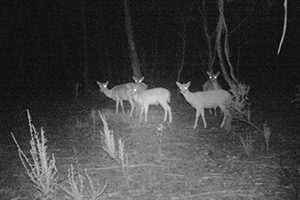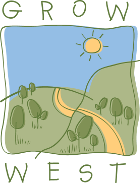4 December 2018

Thirty thousand hectares of public and private property between the Lerderderg State Park, Werribee Gorge State Park and the Brisbane Ranges is the target of a large-scale pest plant and animal control project.
The three year project being led by the Grow West program is working to protect and enhance threatened plants and animals in Melbourne’s west by creating a nature corridor between the reserves.
The region is home to a number of significant species, including the Swift Parrot, Brush-tailed Phascogale, Growling Grass Frog, Diamond Firetail, Bacchus March Varnish Wattle, Clover Glycine and Velvet Daisy Bush.
The nature corridor will provide a life-saving boost to these iconic species by expanding their habitat and helping them adapt to environmental change.
During its first year, the project has achieved the following successes:
- 600 hectares of the Werribee Gorge State Park and the Long Forest Conservation Area have been surveyed and treated for Serrated Tussock
- 10,000 hectares of the Brisbane Ranges National Park have been treated for invasive weeds including Sallow Wattle, Gorse and African Love Orchid
- 5,600 hectares of the Brisbane Ranges National Park have been surveyed for feral cats, with traps set
- 1,029 hectares of the Werribee Gorge have been treated for rabbits
- 16,646 hectares of the Brisbane Ranges National Park have been surveyed for deer, with five control programs undertaken
- 10,000 hectares in the Lerderderg State Park have been surveyed for feral goats, with 64 controlled.
Works were completed by Trust for Nature and Parks Victoria, with the support of the Port Phillip & Westernport Catchment Management Authority.
The project is a collaboration between government organisations, local councils, landowners, Traditional Owners and Landcare and Friends of groups and is funded by the Victorian Government’s Biodiversity On-Ground Action grants program.
Trust for Nature’s Chris Lindorff said, “Trust for Nature has been working with private landholders to protect important habitat across Victoria for over 46 years… 79 per cent of native habitat on private land in Victoria is considered threatened so work like this which helps landholders look after threatened species is incredibly important.”
The project complements and enhances works already carried out by local landholders and community environmental groups and is working towards achieving Grow West’s vision to connect the three large public land reserves.
Port Phillip & Westernport CMA’s Emma Muir said, “Grow West focuses on large-scale landscape change in the Upper Werribee Catchment … over the past 15 years it has brought multiple organisations, local community groups and landholders together to restore degraded habitats.
Parks Victoria’s Area Chief Ranger, Stuart Lardner, said, “These parks are home to plant and animal species of state significance.
“This important conservation program is helping protect these special places from the potential serious impact of invasive and feral species.”

